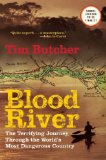Summary | Excerpt | Reviews | Beyond the Book | Readalikes | Genres & Themes | Author Bio

The Terrifying Journey Through the World's Most Dangerous Country
by Tim Butcher
He could see I was skeptical. 'It's OK; these bikes
are amazingly strong.' I found him reassuring. The same cannot be said
for Fiston, who had turned up stinking of booze, and swaying
extravagantly. Benoit would ride alone with his unfeasibly large load;
Odimba, Benoit's colleague from Care International, would follow with
Georges as a passenger; and I would sit behind the sozzled Fiston and
pray for him to sober up.
The engines of the three bikes stirred into life. In
silent Kalemie even these puny machines sounded impressive. I love
starting a journey very early in the day: it offers the comforting sense
that if something goes wrong, there is still the whole day to sort it
out. As we left Kalemie before dawn that August morning, I felt a strong
sense of wellbeing.
There was one other thing to consider. Georges said the news
about the mai-mai group chimed with what he had already heard in Kalemie. 'These
guys get drunk and stoned by the afternoon, and you don't want to be negotiating
with them in that state. We must get there as early in the morning as possible
for the best chance of getting through.'
Five kilometers later we had our third flat tire. The rear on
Fiston's bike had gone down again. Now Benoit was getting agitated. After
botching an emergency repair we scooted on until we reached a village, a
collection of small huts, made with materials from the bush - frames of branches
covered with grass.
While Benoit began working on Fiston's lacerated inner tube,
Georges beckoned me over to a small boy wearing rags. 'He says this village is
called Ngenzeka and that there was fighting here a few years back. He asked if
you want to see the bones.' The boy had the expression of an old man on his
10-year-old face. It was careworn, cold and unsmiling.
The arrival of our small convoy must have been the most
interesting thing to happen in Ngenzeka for months, but there was no sparkle of
excitement in his expression. He took me a few paces off the track. The bush was
thick, but he skillfully slipped through the branches. He was wearing nothing but
some grubby brown shorts, several sizes too big for him, but he twisted and
shimmied without getting snagged on thorns that scratched my skin.
After a few minutes I emerged from a thicket to find him
standing over a human skull, bleached on the ground. There was no lower jaw, the
front teeth were missing and I could see a web of cracks in the cranium. The boy
spoke quietly. 'There was fighting here one day. We do not know who was fighting
who. We just ran away into the bush. But when we came back there were too many
bodies for us to bury. Some of them were left out in the sun like this.' As we
walked back to the track he pointed to other human bones lying white among the
green undergrowth.
Benoit was not interested in old bones. He suggested that as
we were already way behind our safe schedule and more punctures were likely,
Georges should set off back with Fiston. Georges was reluctant to head home
before he had earned his fee, but Benoit insisted. I was sad to say goodbye, but
I gave him the donation I had promised. 'The parting of good friends,' Georges
said, shaking my hand and smiling.
Without Fiston and his faulty bike, our progress improved and
my spirits picked up. Within an hour we had covered as much ground as in the
first five hours of the day. Bumping along on the back of Odimba's bike, I
noticed the landscape begin to change. After the ups and downs of the earlier
ridge track, we were now crossing flatter savannah. The track was just wide
enough for people to walk single file, but the ground was beaten hard and flat,
so we scooted along faster than at any stage during the journey so far.
For tens of kilometers we saw no villages or signs of life,
slowing only when the track crossed a stream or river. These crossings became
the curse of the journey, there were scores of them. Each crossing was
hazardous, and countless times I had to jump off the back of the bike and help
drag the two bikes across. I saw why any bike bigger than 100cc would be too
cumbersome and heavy to manhandle through the eastern Congo.
From Blood River by Tim Butcher. Copyright Tim Butcher 2007. All rights reserved. No part of this excerpt maybe reproduced without written permission from the publisher, Grove Press.
Your guide toexceptional books
BookBrowse seeks out and recommends the best in contemporary fiction and nonfiction—books that not only engage and entertain but also deepen our understanding of ourselves and the world around us.